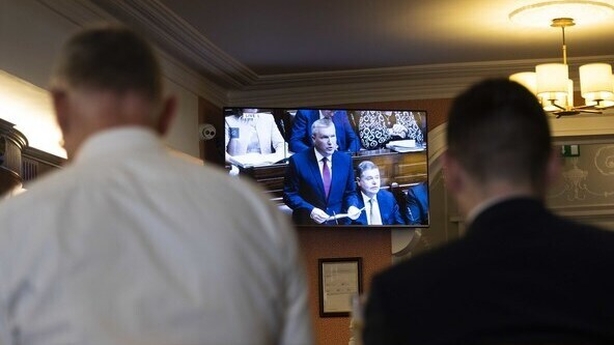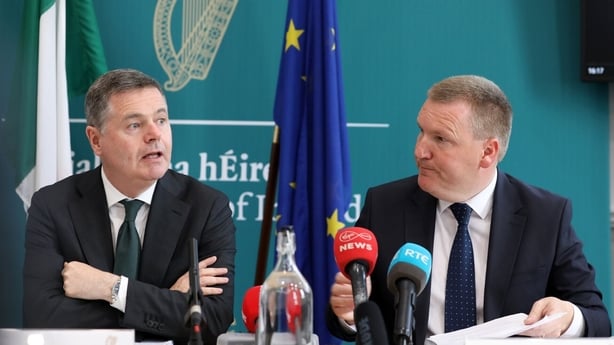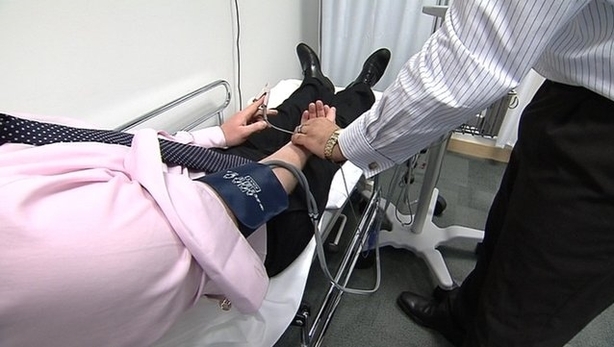A cut to the Universal Social Charge, mortgage interest relief for some and a deferral of an excise duty increase on petrol and diesel to next year have been confirmed in Budget 2024.
Minister for Finance Michael McGrath and Minister for Public Expenditure Paschal Donohoe have outlined the Budget in full in the Dáil.
Further cuts in childcare and a reduction in college fees were also announced, with plans to tax vaping products in next year's Budget.
Carbon tax will increase from midnight and the price of a pack of cigarettes will also rise by 75c.
Minister Donohoe said all households will receive a further set of credits to help with energy bills over the winter.
Three credits of €150 each will be provided between the end of this year and April of next year.
The minister also said a €300 lump sum payment will be made to recipients of the Fuel Allowance in the last quarter of this year, while an additional €200 will also be paid this year to recipients of the Living Alone Allowance.
Two multi-billion euro funds are to be established to futureproof the economy, fund infrastructure and climate projects.
The Future Ireland Fund, with a potential to grow to over €100bn by the middle of the next decade, will help to protect living standards and public services for current and future generations.
Separately, €14bn will be put aside in the Infrastructure, Climate and Nature Fund by 2030 to allow for sustained levels of investment in infrastructure in the event of economic downturns and to support climate and nature related projects.
Mortgage interest relief
Minister McGrath announced the introduction of a one-year mortgage interest tax relief for some home owners who have borne the brunt of interest rate hikes in the last year.
Those eligible to apply will have had an outstanding mortgage balance on their primary dwelling of between €80,000 and €500,000 at the end of last year.
Relief will be available on the increased interest paid on the mortgage in the calendar year 2023 as compared with the amount paid in 2022, at the standard rate of 20% income tax.
The relief will be capped at €1,250 per property.
"Approximately 165,000 mortgage holders will benefit from this measure with an estimated cost of €125 million," Minister McGrath said.
Meanwhile, the Renters' Credit is set to rise to €750 and landlords will get a tax break of €600, which will rise to €1,000, if they continue to rent a property.
#Budget2024 One-year Mortgage Interest Tax Relief for home owners with an outstanding mortgage balance on their primary dwelling house of between €80,000 and €500,000 | Follow live updates: https://t.co/GHCMX8FYfR pic.twitter.com/NoAZc4ArRf
— RTÉ News (@rtenews) October 10, 2023
Cost of living
The Minister for Finance also confirmed that the Government is to defer the final restoration of excise duty on motor fuel which was due to come into effect at the end of October.
He said the outstanding amounts of 8 cent on a litre of petrol and 6 cent on diesel, as well as 3.4 cent on marked diesel, would come into effect in two equal installments on 1 April and 1 August next year.
Minister McGrath also said he would extend the 9% reduced VAT rate for gas and electricity for another year.
The Budget also sees a rise of €12 in welfare and pension payments from January.
A one-off €400 payment will be made for people on the Working Family Payment and those receiving the Carer's Allowance and the Disability Allowance.
A one-off €100 will be paid to those in receipt of the Qualified Child Payment. It is an extra welfare support targeted particularly at lone parents.
An extra child benefit payment will be paid in early December, while a double welfare and pension payment will be made to all qualifying social protection recipients.
Child benefit payments are also extended to those aged over 18 who are still attending secondary school.
The Christmas Bonus to those in receipt of regular Social Protection payments will be paid in early December.

Universal Social Charge
The minister has also reduced the rate of the Universal Social Charge for the first time in five years, from 4.5% to 4% in Budget 2024.
The point at which workers pay the top rate of tax will rise to €42,000.
Employee Pay As You Earn (PAYE) and earned income tax credits have increased by €100 each.
However, Minister Donohoe told the Dáil that it was now "appropriate" to increase Pay Related Social Insurance (PRSI) contribution rates and so from 1 October next year all PRSI contribution rates will increase by 0.1%.
"This measure, which will raise €240m in a full year, is a modest but necessary step to secure pension entitlements for this and for future generations," Minister Donohoe said.
Mr Donohoe also said that weekly Social Protection payments will increase by €12 a week.
In his Budget speech, Minister McGrath told the Dáil that from 1 January 2024 the national minimum wage will increase by €1.40 per hour to €12.70 per hour, and to ensure that such workers remain outside the higher rates of USC, he will be raising the entry threshold to the 4% rate to €25,760 in line with the national minimum wage.
Read more:
Latest Budget stories
Live: Updates as they happen
Budget 2024 - what we know so far
How to stay up to date with Budget 2024 on RTÉ
Budget includes €250m scheme to help firms with costs

Childcare and education
Childcare fees are to be cut by a further 25% next year and families with an income of less than €100,000 will have college fees for undergraduate students halved to €1,500, Minister Donohoe confirmed.
Other families will see college fees for full-time undergraduate students cut by €1,000.
Free school books for students in the first three years of secondary school was also announced in the Budget at a cost of €55m.
The measure, which will be introduced next September, will mean that 770,000 students across primary and secondary schools will get free text books and work books.
Schools will also get a once off additional cost of living funding of €61m to help meet day-to-day expenses, known as capitation. Last year the once off support to schools amounted to €100m.
More young people will also qualify for cheaper public transport fares under Budget changes.
The change will see 24 and 25-year-olds becoming eligible for the Young Adult Card for the first time. The card allows half-price fares on public transport and with participating commercial operators.
In other measures which will benefit students and their families, renters tax credits are being extended to parents who pay for their student children in 'digs' accommodation where they rent a room in someone's home. This will apply retrospectively for last year and this year.
Health waiting lists
Minister for Public Expenditure Paschal Donohoe said that Budget 2024 has provided for a total allocation of €22.5 billion for the public health system.
This includes an €808m increase in core current funding to address demographic and service pressures, Mr Donohoe said.
There are almost 900,000 people on some form of waiting list, most of these waiting for an outpatient appointment.
Extra funding will also be provided for the Child and Adolescent Mental Health Services (CAMHS) to fill vacant staff posts and cut waiting times for patients.
It follows highly critical findings in a recent Mental Health Commission Report on the CAMHS services.
A key focus of health funding will be on reducing waiting times for treatment and reducing delays in urgent care at emergency departments.

Housing
During his Budget speech, Minister Donohoe said housing delivery was "performing strongly" and that the Government expects to exceed its target of delivering 29,000 new homes by the end of this year.
The minister said that next year, the progress will be accelerated with just under €7bn of funding to the Department of Housing, Local Government and Heritage, of which €2.6bn will be capital investment in housing.
He said that among the measures is €1.9bn in capital funding in 2024 to deliver 9,300 new build social homes and €265m to support the delivery of 6,400 affordable homes in 2024.
Gardaí
A package of €172 million has been committed for justice in 2024.
Minister Donohoe announced funding for the recruitment of 1,000 gardaí next year and up to 250 garda civilian staff in specialist roles "to free up more gardaí for frontline policing duties".
He also announced an additional €25m in the annual overtime budget for gardaí.
Budget 2024 also provides for additional staffing in the Courts Service, Prison Service, the Data Protection Commission and Policing Authority, as well as an increase in the range of Domestic, Sexual and Gender-Based Violence (DSGBV) initiatives and the extension of Youth Diversion Programmes throughout the State.
The garda training allowance will increase to €305 per week when payments will begin on 1 January, those in training between Budget Day and the new year will receive a backdated payment for this period in January.
There will also be funding for the first garda reserve recruitment campaign since 2017.
'Climate and nature war chest'
The 'climate and nature war chest' means that investment in environmental projects will be prioritised in the years ahead.
Although the exact projects that will be funded have not yet been decided, it is expected that the focus will be on projects that help cut Ireland's use of imported fossil fuels, make public and private buildings more energy efficient, support the rollout of district heating, restore natural habitats, improve water quality in rivers and lakes, reintroduce once-common species such as eagles and osprey, and remove river barriers that stop fish swimming upstream.
Speaking at Government Buildings this morning, Taoiseach Leo Varadkar said there would be something in it for everyone, predicting Budget 2024 will be "mainly good news".
With additional reporting by Fergal Bowers and Paul Cunningham







